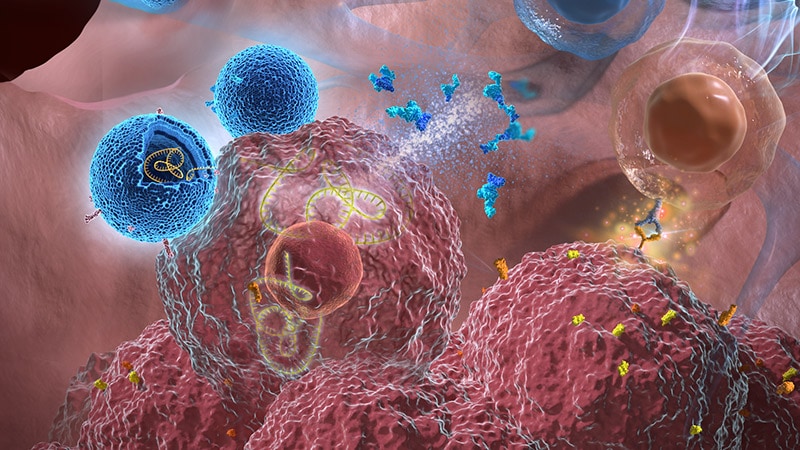Inhalable Lung Cancer Treatment Breakthrough
Główne pojęcia
Exosomes deliver potent immunotherapy to lung cancer tumors via inhalation.
Streszczenie
Cells communicate through exosomes, tiny spheres carrying essential materials.
Columbia University study demonstrates exosomes delivering immunotherapy to lung cancer.
Exosomes offer localized mRNA-based treatment without systemic side effects.
Inhalation of exosomes is noninvasive and effective.
Exosomes show promise in therapeutic uses, inhalable treatments, and safe drug delivery.
Exosomes deliver IL-12 mRNA to lung cancer cells effectively.
Inhaled exosomes trigger immune response against lung cancer with minimal side effects.
Exosomes act as a vaccine, training the immune system to fight cancer.
Exosomes are researched for various medical applications beyond cancer.
Exosome research has grown significantly, especially in cancer treatments.
Inhalable treatments could revolutionize lung cancer therapy.
Challenges remain in scaling up exosome production for human trials.
Inhalable exosomes offer a unique delivery method for IL-12 immunotherapy.
IL-12 has shown promise but faced challenges in delivery methods.
Various drug delivery approaches aim to make IL-12 safe and effective.
Why a New Inhalable Lung Cancer Treatment Is So Promising
Statystyki
"Cheng expects a human trial could launch within 5 years."
"Currently, 52 clinical trials using exosomes in cancer diagnosis or treatment have been completed, are underway, or are looking for participants."
"IL-12 showed serious side effects that stalled research in the 1980s."
Cytaty
"Exosomes work like text messages between cells, sending and receiving information."
"This is an interesting study that explores the inhalable delivery of engineered EVs for the treatment of lung cancer."
"Exosomes have a good safety profile and are able to remain in the lung for quite a long time."
Kluczowe wnioski z
by Sari Harrar o www.medscape.com 03-19-2024
https://www.medscape.com/viewarticle/why-new-inhalable-lung-cancer-treatment-so-promising-2024a100052z
Głębsze pytania
How can the use of exosomes in cancer treatment impact other medical fields?
Exosomes, originally seen as cellular trash, have now emerged as a promising tool in cancer treatment due to their ability to deliver therapeutic agents directly to target cells. The use of exosomes in cancer treatment can have significant implications for other medical fields as well. For instance, exosomes could revolutionize drug delivery systems for various diseases beyond cancer, such as wound healing, pneumonia, heart attacks, and bowel disorders. Additionally, exosomes can serve as biological markers for new diagnostic tests in conditions like cancer and other diseases. The versatility and potential of exosomes make them a valuable asset in advancing medical research and treatment across multiple disciplines.
What challenges might arise in scaling up exosome production for widespread use?
While exosomes show great promise in medical applications, scaling up their production for widespread use poses several challenges. One major challenge is ensuring consistent and high-quality production of exosomes in large quantities to meet the demand for treatments. The scalability of exosome production methods, such as isolation and purification techniques, needs to be optimized to achieve cost-effective and efficient manufacturing processes. Additionally, standardization of production protocols and quality control measures are essential to guarantee the safety and efficacy of exosome-based therapies on a large scale. Regulatory approval and compliance with manufacturing standards are also critical factors that need to be addressed when scaling up exosome production for widespread use.
How can the history of IL-12 research inform future approaches to immunotherapy?
The history of IL-12 research provides valuable insights that can guide future approaches to immunotherapy. IL-12, known as a potent immunotherapy agent, faced challenges in the past due to serious side effects that hindered its clinical development. By learning from the setbacks and successes of IL-12 research, researchers can explore innovative delivery methods to make immunotherapy safer and more effective. Future approaches may involve encapsulating IL-12 in different carriers, utilizing mRNA technology to target specific cells, or combining IL-12 with other therapeutic agents for enhanced efficacy. Understanding the complexities of IL-12 research can help researchers design novel strategies that maximize the therapeutic potential of immunotherapy while minimizing adverse effects, paving the way for the development of safer and more efficient cancer treatments.
0
